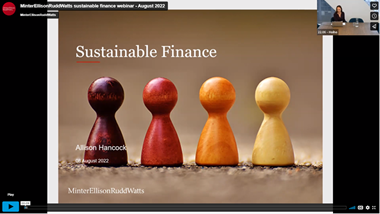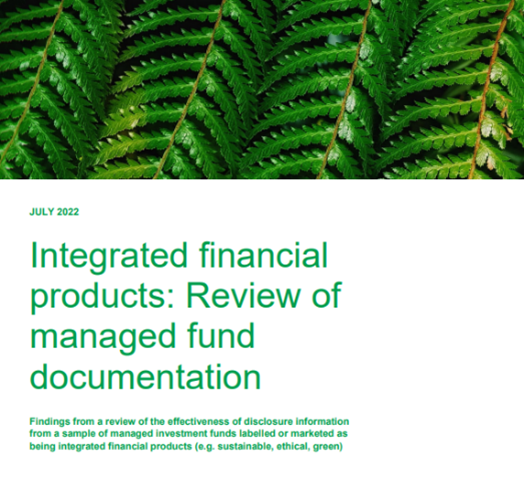Welcome to our fifth issue of Tirohanga:[1] Financial Services Quarterly Outlook.
The past three months in the financial services sector have seen changes at the Financial Markets Authority (FMA) which will have significant implications.
Early this year, Samantha Barrass was appointed as the new CEO of the FMA, signalling the tides at the regulator are changing. Ms Barrass laid out the direction she wants to take the FMA at the Financial Services Council (FSC) Conference in September this year, saying she aims to put consumers “at the heart” of the FMA’s work. Ms Barrass believes that to achieve this there must be deeper engagement with the financial services sector, as the regulated are better placed than the regulators to determine what actions are necessary to improve the consumer experience.
In this issue, we explore the potential impact of these developments on the financial services sector, highlight other issues we see as coming to the fore in the industry, and recap some of the work we have been involved in over the past three months. We also highlight another of one of our exceptional alumni, Hartley Spring, who is now a Senior Associate at Herbert Smith Freehills.
We hope you enjoy this issue of Tirohanga, Please get in touch if you have any suggestions or topics you would like us to cover, or if you would like to join the mailing list to receive our regular short updates. Here you can look back at our first, second, third and fourth issues.
Trends: What themes will we see in the next three months?
In many ways the trends we see in the next three months are a continuation, and in some areas an intensification, of the main themes we identified in our last issue. There are, however, new changes which we see as likely to spur on new trends.
Changes at the key regulators
In our previous issue of Tirohanga, we predicted that Barrass’ appointment as the new CEO of the FMA would bring new priorities and approaches to the FMA’s supervision and enforcement, and this has proved to be the case (as expressed in her recent speech to the FSC Conference). We anticipate that the impact of the FMA’s new approach and priorities will likely be seen in the next couple of months.
For the FMA release on its new structure see here.
Continuing wave of law reform
Work from the External Reporting Board (XRB) has continued on the climate-related disclosures requirements introduced by the Financial Sector (Climate-Related Disclosures and Other Matters) Amendment Act 2021 (CRD Regime). At the end of July, the XRB released an exposure draft of the Climate Standards and draft guidance documents for consultation. This was the last consultation on the Climate Standards, and the XRB expects to issue the final version in December 2022.
Additionally, the Financial Markets (Conduct of Institutions) Amendment Act 2022 was passed by Parliament at the end of June – so registered banks, licensed insurers and licensed non-bank deposit takers will be subject to a new legislative regime (CoFI Regime) by early 2025. MBIE is currently seeking feedback on the supporting regulations for the new CoFI Regime and the proposed fees through two separate consultations.
Continuing M&A activity
This year has been largely defined by a surge of M&A activity in relation to financial services businesses, and we discuss the details of some of the M&A deals that the Financial Services Team has worked on below. This trend seems set to continue for the rest of the year as global equity markets remain volatile, pulling overseas investors to the relative stability and predictability offered by New Zealand financial services businesses.
Interest rates and the risk of recession
Global economic conditions such as rising and volatile prices, fragile supply chains, and rapid monetary tightening by central banks, has significantly impacted the New Zealand economy, and these effects can be expected to persist for the rest of the year. Everyday New Zealanders are starting to feel the pinch of rising interest rates and inflation; however, figures from the Reserve Bank of New Zealand (RBNZ) showed a 1.7% growth in GDP in the quarter ending June – dispelling concerns (at least temporarily) that New Zealand will fall into recession. More anaemic economic growth is forecast by the RBNZ for the following quarters. On the 5th of October the RBNZ announced the continuation of interest rates hikes with an increase of the Official Cash Rate to 3.5% per annum (previously 3%). Through this increase, the RBNZ hopes to “maintain price stability and contribute to maximum sustainable employment.”
What we’ve been up to
Over the third quarter of 2022, we’ve been busy helping our clients on some interesting and ground-breaking projects, along with hosting exciting and insightful seminars. Obviously much of our work remains confidential, but we have highlighted some examples which are now public (we can only include transactions which have been announced, or which the client has consented to us referencing). These include:
Acquisition of Partners Life by Dai-ichi Life
In August we announced the billion-dollar deal for Dai-ichi Life, a Toyko-listed global insurer, to purchase New Zealand life insurer, Partners Life. The Financial Services Team’s involvement included Lloyd Kavanagh (Partner), Maria Collett-Bevan (Senior Associate), Sarah Jones (Solicitor), and Scott Yang (Solicitor). The transaction resulted in Dai-ichi Life acquiring 100% of the shares in Partners Group Holding Limited, the parent company of Partners Life Limited. An application has been made to the RBNZ for approval of the transaction pursuant to the Insurance (Prudential Supervision) Act 2010 (IPSA). To read more about this work we did for Dai-ichi Life, please click here.
Investment into PMG Group Ltd
Most recently, as part of the wave of M&A deals in the financial services sector, we acted for Oriens Capital Fund 2 LP (an investment vehicle for the private equity investment manager) in their subscription of shares in PMG Group Limited (a property investment and property management services business). This involved working closely with our Corporate Team in advising on regulatory requirements and compliance obligations, conducting due diligence, and preparing the share sale materials in a tight timeframe. For more details, see here.
Assisting clients with the FMA/RBNZ Governance Thematic
The Financial Services Team assisted board members, committee members and senior executives at some leading financial institutions in preparation for onsite interviews by the FMA and RBNZ as part of their thematic review on governance. This review focused on the boards of regulated entities and their ability to effectively govern and provide oversight for their businesses. The FMA and RBNZ investigated the structure and operational practices of their boards to determine how effective they are, and their level of adherence to governance expectations. Once complete, regulators have stated that they will:
- provide specific feedback to each entity that participated in the review; and
- publish a joint thematic report. This report will not identify participants, and findings will not be attributable to a particular entity. We expect this will now be published in mid-2023.
Client presentations
We have presented several client trainings over the last quarter covering recent legislative developments and market trends in the financial services sector.
In July, Richard Wells (Partner), Kate Lane (Partner), and Shona Foster (Senior Associate) ran a training on the Fair Trading Amendment Act 2021, where they discussed the extension of the unfair contract terms (UCT) framework to standard form small trade contracts, the specific challenges this will present to participants in the banking and finance sector, and how to best approach these challenges. A particular focus of the presentation was on how this change will significantly increase the number of standard form contracts used by financial institutions that are subject to the UCT Regime. Recommendations were given on how this should change the approach that clients take to drafting contracts.
To read more about the new UCT Regime, please click here. If you would like to know more about the new UCT Regime and how it may affect your business, please contact one of our experts.

In August, Allison Hancock (Senior Associate) from our Banking Team led a training which focused on the lending side of sustainable finance. Allison discussed how “Green Bonds”, which are issued by lenders to fund environmentally friendly projects, started the sustainable finance trend, and have since been followed by “green loans”. Details were provided on the four components of a green loan, which are use of proceeds, process for project evaluation and selection, management of proceeds, and reporting. Sustainability linked loans, and how they compare to green loans, were also covered.
To read more about sustainable finance, please click here. If you would like to know more about sustainable finance and how it may affect your business, please contact one of our experts.

In September, Maria Collett-Bevan (Senior Associate) and Shaanil Senarath-Dassanayake (Solicitor) from our Financial Services Team gave an informative training on the CRD Regime. The training explored what the requirements of the CRD Regime are, their introduction to New Zealand, and the application and implications of the CRD Regime. The obligations the regime entails were discussed in detail, along with more specific considerations such as the need for managers of managed investment schemes to consider changes to their status during an accounting period, and to conduct a holistic style of reporting. Maria and Shaanil also covered the topic of climate change litigation to bring attention to the potential consequences of defective disclosure.
To read more about the CRD Regime, please click here. If you would like to know more about the CRD Regime and how it may affect your business, please contact one of our experts.

Cover to Cover on insurance regime
Maria Collett-Bevan and Sarah Jones have spoken at a number of insurance roundtables held earlier this year about the proposed Insurance Contracts Bill. The Bill signals the Government’s intention to make fundamental revisions to insurance law in New Zealand. If the Bill is enacted, it will have a profound impact on insurers and brokers. The Bill proposes to include significant changes to the duty of disclosure, open up insurance contracts to the unfair contract terms regime in the Fair Trading Act 1986, introduce new obligations in relation to the presentation of insurance contracts, and consolidate the current disparate insurance legislative regime into (nearly) a single statute. At the insurance roundtables this year, the team covered the changes proposed by the Bill, and discussed the impact of the proposed changes on brokers.
For more detail please click here and here. In the upcoming insurance roundtable in November, Sarah will discuss the impact for insurers should insurance contracts be subject to the unfair contract term regime.
To sign up for our November round table, please click here.
Looking forward
Final version of the XRB climate standards (and the FMA focus on Greenwashing)

As mentioned above, the final version of the XRB Climate Standards can be expected this December. For those in governance or management roles, Environmental, Social and Governance (ESG) factors should be front of mind when considering how to keep up with the market and meet customer expectations. In July, the FMA released the “Integrated Financial Products (IFP) Review”, where it investigated the effectiveness of disclosure information from a sample of managed investment funds labelled or marketed as taking into account ESG factors. The FMA was critical, claiming weaknesses in their information disclosure made it “difficult, or in some cases impossible, for an investor to fully understand the nature of the investment they are making.” Managers should consider the FMA’s recommendation that they work on developing a more mature approach to disclosure of features, risks, and benefits of IFP funds.
Still waiting for the release of the AML/CFT Statutory Report
On 30 June 2022, the Ministry of Justice (MoJ) presented its report on the Statutory Review of the Anti-Money Laundering and Countering Financing of Terrorism Act 2009 (AML/CFT Act) to the Minister of Justice. The Minister is required under the AML/CFT Act to present a copy of the report to Parliament “as soon as practicable” after receiving it and decide whether changes to the regime are appropriate. However, that has not yet occurred, some 3 months later.
The review started in Q4 of 2021 and promised to involve a root and branch reassessment of a key regime which has had a major impact across the financial services sector since it came into force in 2013. This followed the release by the Financial Action Task Force (FATF) of their Mutual Evaluation of New Zealand in April 2021, which noted that some improvements to the New Zealand AML/CFT regime were necessary to bring them up to the high FATF standards.
Our own Lloyd Kavanagh is a member of the MoJ’s Industry Advisory Group. MinterEllisonRuddWatts filed a submission which made key recommendations as to how New Zealand’s AML/CFT regime could be made more fit for purpose.
For more information about the Statutory Review process, please click here.
If you would like to know more about the Statutory Review of the AML/CFT Act and how it may affect your business, please contact Lloyd Kavanagh or one of our other experts.
Progress of the Deposit Takers Bill
The Deposit Takers Bill was introduced to Parliament on 22 September. It is expected to come into force as law after receiving Royal Assent in mid-to-late 2023. After the Act comes into force, there will be a transition period to allow both the Reserve Bank and regulated entities time to adapt to the new regime. A significant work programme over several years will be required to implement the new prudential framework for deposit takers (i.e. banks and non-bank deposit takers). Further public consultation is expected on the funding framework, which includes industry levies, before the depositor compensation scheme is implemented.
For more information about the Deposit Takers Bill, please click here.
If you would like to know more about the Deposit Takers Bill and how it may affect your business, please contact one of our experts.
RBNZ seeking feedback on policy for branches of overseas banks
In August, the RBNZ asked for feedback on the second and final consultation on the review of its policy for branches of overseas banks, with submissions due by 16 November 2022. The review aims to “create a simple, coherent and transparent policy framework for branches that protects and promotes financial stability”. Key proposals in the paper include restricting all branches of overseas banks to engaging in wholesale business, to limit the maximum size of a branch to NZ$15 billion in total assets, and to continue to allow dual registration (as an overseas branch and locally incorporated subsidiary).
For more information about the RBNZ’s consultation, please click here.
If you would like to know more about the RBNZ’s consultation and how it may affect your business, please contact one of our experts.
Consultation on the IPSA – Governance, Supervisory processes, and Disclosure
The RBNZ’s consultation on the IPSA continues, and in September it published feedback on responses to the Enforcement and Distress Management consultation. The upcoming reviews in the next quarter (which are expected to be released in October) focus on governance, supervisory processes, and disclosure. Once the targeted consultations are complete, the RBNZ will release an omnibus consultation setting out its recommended reforms to the IPSA. This omnibus consultation is expected to be released in the first half of 2023. Following the omnibus consultation, the RBNZ will aim to introduce a draft amendment bill to Parliament before the end of 2024. The timing for the implementation of the Bill has not yet been released.
For more information about the RBNZ’s feedback on responses to the Enforcement and Distress Management Consultation, and the upcoming Governance, Supervisory Processes, and Disclosure consultation, please click here.
If you would like to know more about the RBNZ’s consultations on the IPSA, please contact one of our experts.
Developments on Cryptoasset Regulation in Australia
In late August, the Australian Government announced it was starting a consultation process on how Australia’s regulatory system manages cryptoassets. The purpose of this consultation is to keep up with developments in the industry and provide protections for consumers. Like the rest of the world, Australia is experiencing a digital revolution across all sectors, and is recognising that regulation is struggling to keep up with the cryptoasset sector, which remains largely unregulated. The Government’s first step will be to prioritise “token mapping” to help identify how cryptoassets and related services should be regulated. A public consultation paper is expected to be released in the coming months. This exercise has not been undertaken anywhere else in the world and will provide a potential path for the New Zealand Government if and when it turns its mind to the regulation of cryptoassets, which also remain largely unregulated under the Financial Markets Conduct Act 2013, the Anti-Money Laundering and Countering Financing of Terrorism Act 2009, and the Financial Service Providers (Registration and Dispute Resolution) Act 2008.
If you would like to know more about the regulation of cryptoassets in New Zealand and what it means for your business, please contact one of our experts.
CoFI – MBIE’s consultation on the proposed licensing fees for financial institutions and exposure draft regulations.
In September, the FMA released two consultations on the CoFI Regime. These consultations seek feedback on the supporting regulations to the CoFI Regime relating to the prohibition of sales incentives based on volume and value targets, and the proposed licensing fees for financial institutions. Submissions on the former are due by the 9 November 2022, and submissions on the latter are due by the 26 October 2022. The draft regulations are anticipated to be made in Q1 of 2023, and will likely come into force in early 2025 along with the rest of the new CoFI Regime.
For more information about the MBIE’s consultations on the new CoFI Regime, please click here.
If you would like to know more about the new CoFI Regime and what it means for your business, please contact one of our experts.
Alumni spotlight – Hartley Spring
In this issue of Tirohanga: Financial Services Quarterly Outlook, we shine a light on our alum Hartley Spring. Hartley joined the Financial Services team as a Law Clerk in 2016 and stayed with the team as a Solicitor until May 2018. His time with us included a stint as a Secondee Adviser at the FMA. Hartley was a valued member of the team and contributed to a wide variety of client advisory and transactional work.
Hartley then moved to Herbert Smith Freehills in Sydney in August 2018, where he is now a Senior Associate in their Corporate – Financial Services Regulatory team. His primary area of expertise is superannuation, including successor fund transfers, product rationalisation, distribution, and regulatory advice. He also advises on retail financial services generally such as financial advice, insurance, platforms, managed funds, strategic regulatory advice, and investigations.

In case you missed it
In September, we were delighted to welcome back Zena Razoki (Senior Associate) from parental leave. Zena has returned to us on a part-time basis, working three days a week. Since she returned Zena has been busy helping our clients with advice on CoFI and some new ventures funds. However, we were sad to see Lana Ou (Solicitor) move on from our Financial Services Team in July. Lana has taken up a position at Herbert Smith Freehills in Sydney, where she may well work along-side Hartley from time to time.
We are continually publishing financial services updates on industry developments that we think our clients might be interested in. If you’ve missed some of our updates, below is a list of what we’ve published in the last quarter.
Enforcement
- FMA Issues Infringement Notice Against Alliant Perpetual for Failing to File Financial Statements
- FMA Directs Kalkine to Cease Misleading Conduct
FMA
- FMA Review of ESG Funds
- FMA Consumer Survey Indicates Need for Improvement in Financial Sector
- FMA Releases Annual Corporate Plan
Sustainability and Finance
Crypto-Assets
Insurance
AML/CFT
Law reform
- Further Consultation on IPSA: Enforcement and Distress Management for Insurers
- Proposed Standard Conditions for Licences Under CoFI
- XRB Releases Exposure Draft of Climate Standards and New Draft Guidance Documents for Consultation
- RBNZ Seeks Feedback on Policy for Branches of Overseas Banks
- Consultations on CoFI Regime Released
[1] Tirohanga is Te Reo Māori (New Zealand’s first language) for “view”, “viewpoint”, “perspective” or “outlook”.
Key contacts
Speak with one of our experts.





